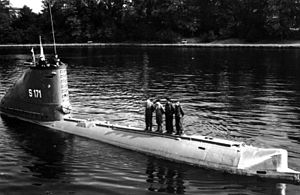German submarine Hai
 Postwar photo of Hecht (S-171), (former Type XXIII submarine U-2367). An identical sister ship of U-2365
| |
| History | |
|---|---|
| Name | U-2365 |
| Ordered | 20 September 1944 |
| Builder | Deutsche Werft AG, Hamburg |
| Yard number | 519 |
| Laid down | 6 December 1944 |
| Launched | 26 January 1945 |
| Commissioned | 2 March 1945 |
| Fate | Scuttled on 8 May 1945, raised in June 1956 |
| Name | Hai |
| Namesake | Shark |
| Commissioned | 15 August 1957 |
| Identification | Pennant number:S 170 |
| Fate | Sunk on 14 September 1966, raised on 19 September 1966 and broken up |
| General characteristics | |
| Class and type | Type XXIII submarine |
| Displacement | |
| Length | |
| Beam |
|
| Draught | 3.66 m (12 ft) |
| Installed power |
|
| Propulsion |
|
| Speed |
|
| Range |
|
| Test depth | 180 m (590 ft) |
| Complement | 14–18 |
| Armament |
|
| Service record (Kriegsmarine) | |
| Part of: |
|
| Identification codes: | M 51 377 |
| Commanders: | |
| Operations: | None |
| Victories: | None |
German submarine Hai, the former U-2365 Type XXIII U-boat of Nazi Germany's Kriegsmarine during World War II, was one of the first submarines of the Bundesmarine. She was ordered on 20 September 1944, and was laid down on 6 December 1944 at Deutsche Werft AG, Hamburg, as yard number 519. She was launched on 26 January 1945 and commissioned under the command of Oberleutnant zur See Fritz-Otto Korfmann on 2 March 1945.[3] Scuttled on 8 May 1945, the boat was raised in June 1956 and commissioned into the newly founded Bundesmarine as Hai, where she served until she sank by accident on 14 September 1966.
Design
[edit]Like all Type XXIII U-boats, U-2365 had a displacement of 234 tonnes (230 long tons) when at the surface and 258 tonnes (254 long tons) while submerged. She had a total length of 34.68 m (113 ft 9 in) (o/a), a beam width of 3.02 m (9 ft 11 in) (o/a), and a draught depth of 3.66 m (12 ft). The submarine was powered by one MWM six-cylinder RS134S diesel engine providing 575–630 metric horsepower (423–463 kilowatts; 567–621 shaft horsepower), one AEG GU4463-8 double-acting electric motor electric motor providing 580 PS (430 kW; 570 shp), and one BBC silent running CCR188 electric motor providing 35 PS (26 kW; 35 shp).[4]
The submarine had a maximum surface speed of 9.7 knots (18.0 km/h; 11.2 mph) and a submerged speed of 12.5 knots (23.2 km/h; 14.4 mph). When submerged, the boat could operate at 4 knots (7.4 km/h; 4.6 mph) for 194 nautical miles (359 km; 223 mi); when surfaced, she could travel 2,600 nautical miles (4,800 km; 3,000 mi) at 8 knots (15 km/h; 9.2 mph). U-2365 was fitted with two 53.3 cm (21 in) torpedo tubes in the bow. She could carry two preloaded torpedoes. The complement was 14 – 18 men.[4] This class of U-boat did not carry a deck gun.[3]
Modifications
[edit]In 1963 Hai was fitted at the shipyard of Blohm & Voss with a new diesel engine and at the same time lengthened by 1.2 meters.[5]
Service history
[edit]On 8 May 1945, U-2365 was scuttled northwest of Anholt in the Kattegat as part of Operation Regenbogen. The wreck was originally located at 56°51′N 11°49′E / 56.850°N 11.817°E.[citation needed]
Post war service
[edit]In June 1956, U-2365 was raised by the German Federal Navy and commissioned Hai on 15 August 1957.[citation needed] On 14 September 1966, she foundered on Dogger Bank in the North Sea during a gale. Nineteen of the twenty crewmen were lost, making this one of the worst peacetime naval disasters in German history. She was raised on 19 September 1966 from 47 m (154 ft) of water and broken up.[3]
The wreck was located at 55°15′N 04°22′E / 55.250°N 4.367°E.
See also
[edit]References
[edit]- ^ Helgason, Guðmundur. "Fritz-Otto Korfmann". Uboat.net. Retrieved 30 April 2016.
- ^ Helgason, Guðmundur. "Uwe Christiansen". Uboat.net. Retrieved 30 April 2016.
- ^ a b c Helgason, Guðmundur. "U-2365". Uboat.net. Retrieved 30 April 2016.
- ^ a b Gröner 1991, p. 89.
- ^ "Het ongeluk van de U Boot Hai" (PDF). Klaar Voor Onderwater (in Dutch). Vol. 36, no. 125. Den Helder: Onderzeedienst Reünistenvereniging. September 2013. pp. 3–4.
Bibliography
[edit]- Busch, Rainer; Röll, Hans-Joachim (1999). German U-boat commanders of World War II : a biographical dictionary. Translated by Brooks, Geoffrey. London, Annapolis, Md: Greenhill Books, Naval Institute Press. ISBN 1-55750-186-6.
- Gröner, Erich; Jung, Dieter; Maass, Martin (1991). German Warships 1815–1945, U-boats and Mine Warfare Vessels. Vol. 2. Translated by Thomas, Keith; Magowan, Rachel. London: Conway Maritime Press. ISBN 0-85177-593-4.
- Williamson, Gordon (2005). Wolf Pack: The Story of the U-boat in World War II. Osprey. ISBN 1841768723.
External links
[edit]- Helgason, Guðmundur. "U-2365". Uboat.net. Retrieved 30 April 2016.
